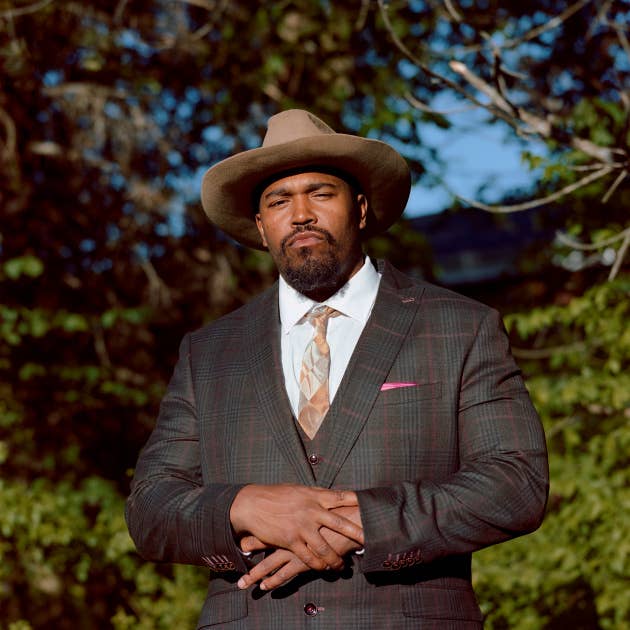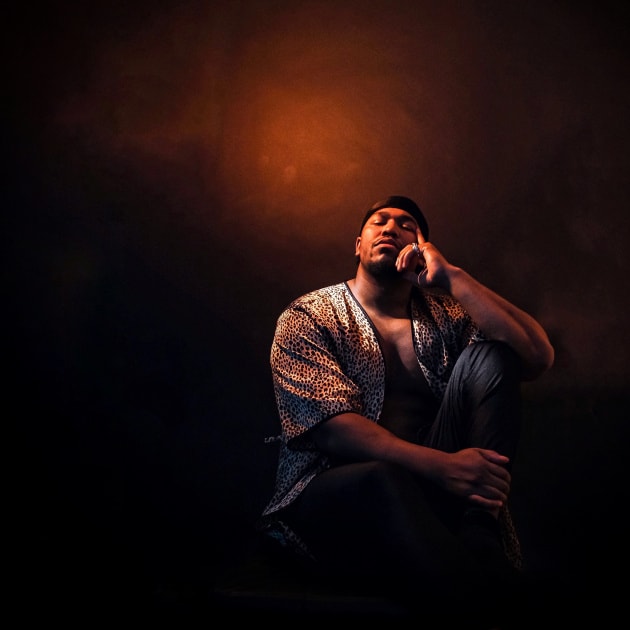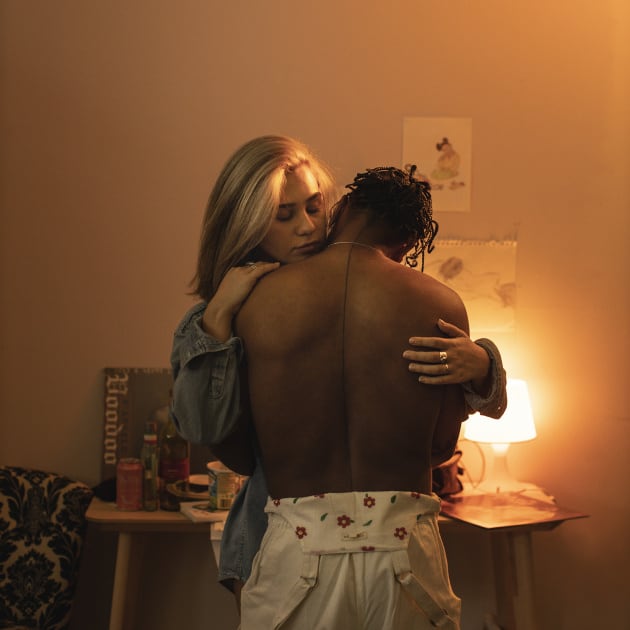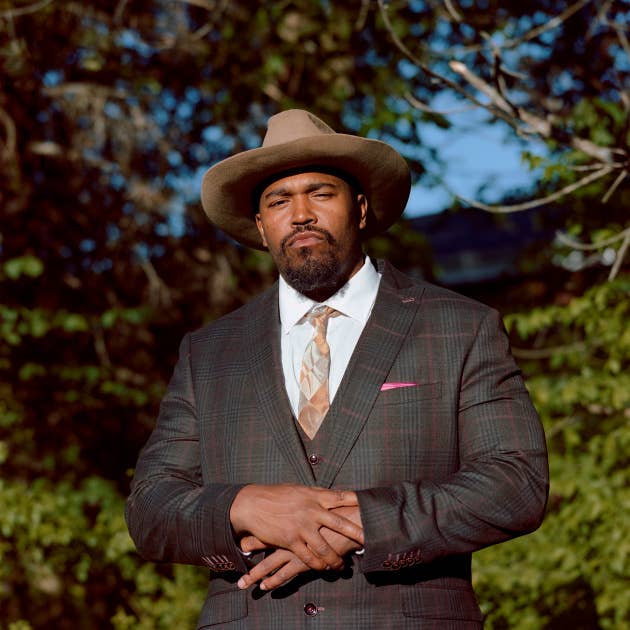
From the depths of solitary confinement to the stages at Atlantic Canada’s biggest festivals. From enduring his neighbourhood’s gang glorification, a result of his ancestors’ displacement from Canada’s Black mecca, to collaborating with The Maritimes’ top hip-hop acts, and finishing trade school along the way. Yes, Aquakultre’s path to recording one of the best Canadian R&B albums of the year has been an unconventional one. Born Lance Sampson, the Haligonian crooner’s latest, Don’t Trip (out July 22 via Forward Music Group and Black Buffalo Records) boasts New Jack soul-worthy singing and brass, Luther Vandross-esque post-disco, and speak-singing ala D’Angelo (for whom Aquakultre is a dead ringer). And while all that makes the LP pantheon-worthy, the lyrical themes on key track “Africvillean Funk” also help Aquakultre rank among Canada’s top protest singers, as he waxes about the namesake city that Black Nova Scotians built and led, only to have it ripped away.
The true north R&B legend in the making spoke to Complex Canada shortly after wrapping the shoot for the “Africvillean Funk” music video, for which he and a number of Haligonian creatives donned era-appropriate attire like three-piece suits and felt fedoras or cowboy hats. Below, Aquakultre tells us more about being a descendent of Canada’s famed Africville, navigating life as an ex-con and learning a trade to support his family, how music once deterred and now sustains his mental health, and more.
Nice cowboy hat!
Thank you! I was wearing it for the video for my single “Africvillean Funk” and just kept it on.
Does the old saying “clothes make the man” apply to performers like yourself?
I used to dress in nice robes to go onstage, but found that I was ripping them a lot. Getting into a nice proper garment can release a certain energy. But what also helps is just being onstage with a lot of folks supporting me. And just being comfortable.
My social media lit up this past spring with photos of you and other performers at Paddlefest in St. Andrews, New Brunswick. A lot of people in the comments, and in the industry that I’ve spoken to for other articles, raved about your set and described you as one of the East Coast’s biggest stars.
Paddle Fest was great! But it was a stressful day. I wrote the exam for my plumbing program that morning, which took three hours. Then I drove straight from there for five hours to Sackville. We stayed in a hotel with furniture from the 1800s. It was beautiful, but I worried the place might be haunted! I brought my daughter with me, and it can be hard to travel with kids, especially when you keep them up late. Despite all that, it was definitely good to get my feet wet there, and have a good reception. It was fun hanging out with a lot of folks and I met some New Brunswick artists I love, like Stephen Hero and Wolf Castle, for the first time. Guys I’d been chatting to on my socials. So all that was a great time.
Speaking of socials: I’ve seen you posting about taking a trade. I’m more familiar with artists waiting tables until they can make their dreams happen. How has this unique experience been for you?
Plumbing’s a struggle, that’s for damn sure. But it’s been my No. 1 since day one. Back when I was young, and finally got out from incarceration, I knew I had to go get a trade, and be that example for people in my community. Make them say, “Oh, he’s doing something different.” It was one of the only things in my life that I started and stuck with.
Music, meanwhile, is my form of release. Which I need, because I’m not the most emotionally expressive person. Balancing music and plumbing only gets hard once you get into touring.
“Anyone can write a song that gets on the radio. But when you dive into the music that’s not that, that’s when you hear the real sh*t.”
But isn’t that a big issue? Musicians supposedly make most of their money on the road these days.
I’ve never been a big tourer. Being home with my family, working on my music, and working at my plumbing career, are the things for me. I’m more about going to do a fest for a weekend here or there then being away for weeks. Those different parts of my life make me super busy, but it’s better than sitting around and letting your mind get to you. Always having something I gotta do is helpful for my personality.
I’d like to be doing more festivals, but there aren’t many that do hip-hop and R&B here out East. There are a lot of folk festivals, and singer-songwriter festivals. But I’m glad they’re starting to mesh things up more, and let different stuff in. I’m very fortunate to be able to get in with different crowds. I’m diverse in the music I put out. My first project [2020’s Legacy] had super guitar vibes. And on my second album [Bleeding Gums Murphy with Halifax producer Uncle Fester, also in 2020] I got into soul and R&B. There are many festivals throughout Nova Scotia each year, so there are lots of avenues for folks to get out and express themselves. I love to perform, but I want to enjoy other people’s music as well. Learn from others, get out and support the people I love, smile at them and tip my hat [tips his cowboy hat].

Is one of the people you love to go see Ghettosocks? After all, when you mention the diversity of your catalogue, that veteran Haligonian MC was who you chose to form Aquasocks with and release HOLOS in 2019.
We don’t have a very long relationship, because I’ve really only been coming around Halifax’s art scenes in the past seven years. I owe a lot of that to my partner Julia [Hutt, who makes art under the name Joolsannie, and with whom Aquakulture co-wrote Don’t Trip single “Lunch”]. I met ‘Socks through Julia. We’re both Leos. He’s probably a lot ruder than me [winks and laughs]. He and I work very good together, and have an energy that feeds off each other well. And we both have that serious drive. I think he gravitated to me because of both my rapping and songwriting capabilities, and how some of my early songs touched his soul. So he took me under his wing. He invited me into the Sipset camp, which is full of very talented rappers, back when I only had two rap songs. I was spooked, quite intimidated. But our chemistry was great.
Then HOLOS came together very quickly. If I was around for a few hours, we’d just sit at the table and write, go back and forth with the lyrics, then send each other 16 or four bar verses. It was organic. When we got in the studio, we already knew our stuff enough because we sat together and wrote it out and vibed together. Shout out to DJ Uncle Fester for putting that project together, because he was a serious piece of that HOLOS album. But I love collaborating with folks, man. Chudi Harris is also my guy. Me and him have had a long musical collaboration.
You have a lot of interesting collaborators on this new album. Chudi is featured on the opening track “I Can Wait,” along with Zamani Folade and Nixx. Uncle Fester, who you mentioned earlier, is featured on “I’m For Real” with Ransom and key Ghettosocks collaborator DK. And pHoenix Pagliacci of the legendary Sorority and TRP.P is on “You Got Feets” alongside Owen O’Sound Lee. How excited are you for people to hear these songs?
With this new album, I want people to get back to moving their bodies. I’m try to bring it back to that golden age ’70s, ’80s, and ’90s R&B. Songs like “Nag Champa,” from Common’s Like Water for Chocolate. Music that’s so beautiful to listen to, but when you hear what he’s saying you go, “Oh my gosh!”
There’s a song on my new album called “Magic.” I tried to give it a post-disco era, Luther Vandross feel. But when you listen you’ll go: “He’s talking about his dad!” And that goes back to my love for hip-hop, and me wanting to speak on some shit that’s been affecting me my whole life. I want to give people a piece of me every time they listen to one of my albums. Because it’s all about keeping it real. When I was younger, I’d ask my homies and ask myself: “What was it that made us so negative?” And it was the music we were listening to. What people listen to is super important. So we have to make sure we’re serving the music.
Like if the music is materialistic, or glorifies gangs? If you put out positive vibes, people will be inspired positively?
I believe that, one hundred. It’s the “Pay It Forward” mentality. The energy you put out, is the energy you’ll get back. That’s what was affecting our mental health and our mental states so badly— the food plays a big part, if you’re always eating junk it’ll mess up your mental health. And it was also the music we were listening to. We were ingesting the most gangster-ass, violent-ass music. So of course we’re going to become that. The energy you put out is very important. That’s just how it is for me.
Your earlier song and video “Pay It Forward” were indeed pretty uplifting, and seemed to strike a chord with a lot of people.
It represents the community I grew up in. “You need food? Come in my house, have a plate.” I think that’s super important, if we’re trying to build a community.
“If the city would give me the money, I would build Africville immediately.”
As good as “Pay It Forward” and the other songs off your last album were, I think Don’t Trip sounds even tighter. What did you do to push your music forward this time?
Just always practicing and trying new things in my home studio. But this new album is where I’ve always been trying to go. Legacy was definitely the funnest trip ever, and it was about showing my art and musicianship. The album after that, Bleeding Gums Murphy, was about showing my rap skills. But Don’t Trip started off as a five-song EP, because I was just sitting around on lockdown and had all these ideas coming to me. And I thought: “People are stuck in their houses, and just need to dance right now!” Then it manifested into an album. People were sending me beats, or I would hear something from a producer friend of mine and it would spark ideas. And this theme just started happening. And Don’t Trip has also allowed me to finally collaborate with people I love as artists. It’s stacked to the teeth. And I’m really happy that the other artists extended their love and appreciation of me. It allowed me to do what I always wanted to do, which is a collaborative, feel-good project. It allowed me to do what I wish we could’ve done on Legacy, because I felt it was dialed back and I wanted to involve other people in it.
It also manifested itself into Julia and I’s relationship. I went from trying to make people feel good during the pandemic to: “Oh, I’m actually talking about, and meshing our relationship in this. And us getting to know each other more deeply throughout this album.” But I wouldn’t have been able to do that without the comfort and privacy and space of my home studio. Which is just a desk, a computer, a microphone, and headphones. And I gotta shout-out the city of Halifax, because I started a GoFundMe for that studio, and people supported me and said, “Here, take this.” That’s the community element of it too. So I’m happy to make this music for the people who supported me since day one.
Is it daunting to write about your relationship, in the way you described?
No not really. Because a lot of my songs are about Julia! [Playfully speaks loudly enough offscreen for Julia to hear, and laugh and groan sarcastically back at him.] Because that’s my life. That’s my partner. I’m obviously going to write about our experiences. I’m going to write about the days I’ve had at work, and conversations I’ve had with people, and their days and lives. It’s never hard to write about what’s real. Never.

Is that an ethos you shared with all these collaborators on this album?
That’s a hard question to answer. Because a lot of these collaborations weren’t in the studio, involving conversations like that. I’d send little demos to people and tell them what they were about. People knew the assignment, and executed it. I’d love to be in the studio and rocking, because that’s my favorite environment, where nothing happens for four or five hours because we’re just talkin’, then certain things manifest from that. I wish it was more like that. There’s only one song like that on the album, where we’re just figuring things out in the studio. And that’s “I Can Wait.” That’s me and Chudi, because we’re always in the studio together and shit just happens. But I’d send stuff to people for the others songs and they’d send it back in a few days, so I’d like to hope it was easy for them. Kudos to them, because it’s hard for me to do that, to receive a package and hone in on a subject like that. It only comes easy for me when something sparks in my head or a situation happens, or somebody says something. Four months can go by with nothing, but then when that spark happens I can write a song in 30 minutes. So shout on everyone on this record, because you executedit!
What were some examples of those collaborators really nailing what you sent them, above and beyond your expectations?
“You Got Feets.” When pHoenix Pagliacci sent back her stuff, Julia and I listened and said: “Can you understand what pHoenix is doing right now? Craaazy!”
And on the song “Hitwoman,” my homie Loser Supreme sent me something back in, like, an hour. I wondered, “How the fuck did you do that whole thing so quick?” I never expected it to turn out how it turned out. That’s the magic of it. You just gotta trust that bounce. Send it off, and whatever it is, it is, and just let that be.
Did you surprise yourself in the same way, in terms of what you came up?
Most certainly. Some of the songs on there really stuck with me. Like “Africvillean Funk.” My ancestors are from Africville. For folks who don’t know: it was demolished under the Act of Urban Renewal in Halifax. There’ve been apologies, and blah blah. But it’s probably been one of the biggest acts of Black displacement in Canada. My uncle, Eddie [Carvery], is still holding the longest protest ever, in terms of us getting that respect and that land back. On “Africvillean Funk,” I could feel my ancestors, my aunts and uncles and grandfather, on there. I tried to manifest how we would feel if we were going through this right now. And the producer Trobiz, a.k.a. Tremayne Howe, is a descendent of Africville too. That connection was important. And I still listen back to that track, and think, “I’m so happy we got to do this. Generations of family, we could be sitting here being the most traumatized people on the planet. But we used what our ancestors gave us to make ‘Africvillean Funk.’” It surprised me, and it surprised Tremayne, who told me: “Yo, you’re finding certain notes and melodies I didn’t even think you’d be able to find.” And I said: “I’m just expressing what was given to me.”
And the title track, “Don’t Trip,” I did not expect it to become what it was. When I sent material to people, they’d quickly hit me back to ask “What’s this ‘Don’t Trip’ one?” And I’d say: “Oh Christ, you like that? I thought you’d like this one.” You don’t know how it’s going to make other people feel. That’s the beauty of music.
On this album people I grew up listening to—Phonte, D’Angelo, Common, Erykah Badu—they were gas to fuel me. And I spread little odes to them throughout.
Many other Maritime artists are looking up to you in a similar way. And you’re getting buzzed as Atlantic Canada’s next big thing. How does it feel to have someone fan out over your music like you do for the artists you just listed?
The best thing is when people tell me how my music made them feel. I’ve had people call me from jail, and tell me, “This song got me through my time in the hole.” And I’ll tell them that’s awesome, because musicians like Rich Aucoin allowed me to get through my own time in prison. When I finally got to meet Rich I said: “Cuz, I got a story to tell you. Your song ‘Want to Believe’—I sang that every day when I was in segregation. To get me through that time.” When I finally got to meet Wintersleep for the first time, I told them about singing their songs every day to other inmates so that we could get through our time in the hole. So it’s great to get those calls from people about my music. As long as Aquakultre is giving people that kind of hope, it’s amazing. But a lot of the times people are trying to tell me that, and we’re in a club, and I’ll tell them: “I can’t hear you! I love you, but can we go outside please?” [Laughs.]
I remember one of the first Aquakultre shows, people were in tears, and my guys onstage told me but I hadn’t seen because I had tunnel vision about what I was doing. I still have trouble taking compliments about my music or what I’m doing. Julia will tell me all the time to learn how to take a compliment, and that’s something I’m still working through. It might be something that happened when I was younger, I don’t know. I might need to go to therapy to find that out! But it’s great that the work we are doing is giving people that hope. I want to be that beacon for youth to look at. Because it was hard growing up in my community with no support from your peers. At all. I just want to make sure folks have that outlet.
Do you want to help build a new Africville?
Oh my gosh, if the city would give me the money, I would build Africville immediately. But I have a career, I just started. I want to be a successful, reliable plumber. I want to get that reputation under my belt. Music is just something I’m able to give to folks to help people to get through their days.
But it’s important as a general thing, regardless of whether it’s from the East Coast or the West Coast or wherever, to look for the music that is different. Look for what doesn’t fit the mould, what’s outside the box. Because a lot of those artists have so much to say. Anyone can write a song that gets on the radio. But when you dive into the music that’s not that, that’s when you hear the real shit. Nothing has to sound perfect, we’re just in here expressing ourselves. Once you start looking into that, that’s when you start finding how music makes people feel, and what it does for people’s mental health, and how it affects people’s day-to-day life. You can really find yourself in that music.



